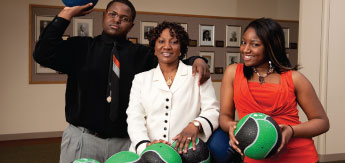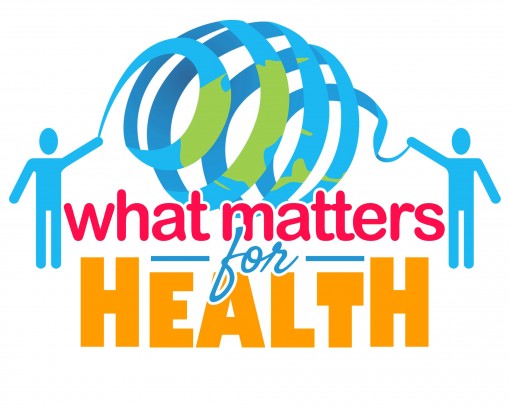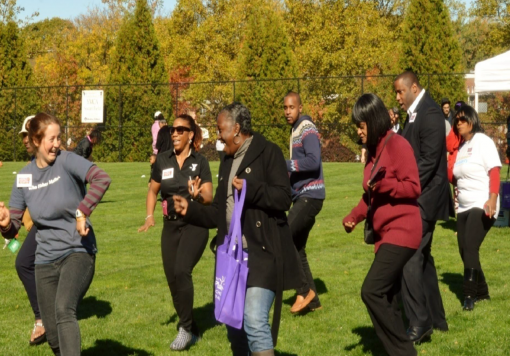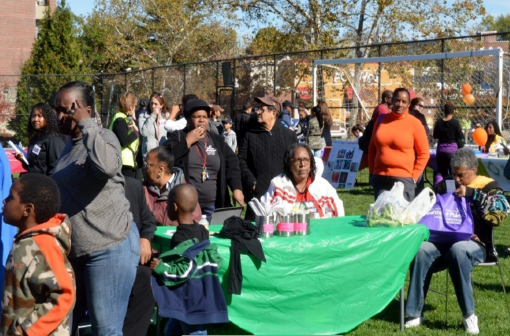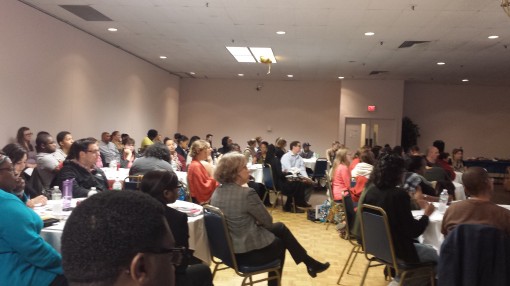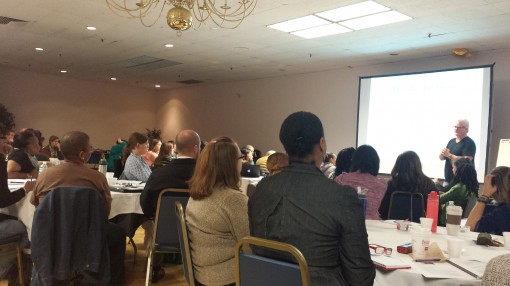What Matters For Health
A gathering on Tuesday, December 9th at Whittier Street Health Center commemorated the finale of What Matters For Health—an online game that provided an opportunity for people who live and work in the neighborhoods of Dorchester, Jamaica Plain, Mattapan, Mission Hill, and Roxbury to share ideas about how to improve health and well-being in the community. Despite the torrential downpour, around 50 residents and community organizations arrived to review the game results and discuss strategies for future implementation.
Between September 29th and October 16th, almost 900 people signed up to play What Matters for Health. The game was first created because Brigham and Women’s Hospital and its community planning partners will be funding programs to support health and well-being of the residents in the target neighborhoods.
Participants were asked 1) what would make Boston a healthier city to live in, 2) what changes would make their individual neighborhoods healthier to live in, and 3) what steps can be taken to make Boston a more racially equitable city.
What Matters For Health elicited a variety of responses:
- Game players felt that Boston could be healthier place to live by focusing on integration across neighborhoods, support low income home buying programs, addressing neighborhood gentrification, investing in grassroots organizations and provide more resources for poor and homeless families
- Residents who specifically lived in the target neighborhood wanted increased access and opportunities to social determinants like healthy food, exercise, economic development, safe bike paths and public transportation. Increased community safety and cohesion, improved community and police officer relationships also came up in the game.
- Residents said that they felt Boston was “slightly equitable,” and having more open dialogue, race explicit policies, equitable public transportation, and high quality public education would make Boston a more racially equitable
Roxbury Rising Against Diabetes
The Roxbury YMCA soccer field was the place for community celebration and great fun on Saturday, October 25th. The YMCA hosted “Celebrating The Fruits Of Our Ocean: Seafood Throwdown,” the culminating event of Roxbury Rising Against Diabetes— a month long series of free events to raise awareness about the prevention and management of Type-2 Diabetes organized by the Healthier Roxbury Coalition.
The Seafood Throwdown featured a head to head cooking competition between two local chefs who presented dishes made with fresh, local fish. Event organizers wanted to give residents the opportunity to taste and learn about how to prepare local, sustainable seafood. Community spirit was in the air as attendees gathered to line dance and participate in Zumba sessions to get their bodies moving with the emcee, Boston City Councilor, Tito Jackson. Almost 300 residents and 50 volunteers were in attendance. Volunteers from UMass Boston played a game of soccer to help get kids active and by the end of the day parents and elders left with their arms full of community resources and raffle prizes.
Healthier Roxbury Coalition, a broad-based collaborative of community leaders, healthcare providers, social service agencies and the Boston Public Health Commission. Healthier Roxbury is supported by Massachusetts Health Quality Partners ‘ Greater Boston Aligning Forces for Quality Initiative with funding from the Robert Wood Johnson Foundation.
Post Traumatic Stress Management and Psychological First Aid
On October 14th and 15th the Boston Teacher’s Union Hall was filled with Boston Public School Teachers, Healthcare Professionals, and residents from all over the city to participate in the Post Traumatic Stress Management and Psychological First Aid 2-day training session. South Boston Collaborative Advisory Network (SBCAN) and Boston Alliance for Community Health (BACH), and the MA Department of Mental Health presented a free, two day certificate course with breakfast and lunch for school and community based responders on these important issues. Collaborators of the training sought to create a community based training in trauma informed care to arm responders with the tools to assist youth and young adults in the aftermath of traumatic incidents such as suicide, overdoses, homicide, accidents, and violence.
Led by Dr Robert Macy and Courtney Grey, attendees learned about the PTSM model of group intervention and participated in practice scenarios to hone their skills at dealing with large scale trauma situations. They also discussed Psychological First Aid, which seeks to decrease the initial amount of stress caused by traumatic occurrences and help victims adopt coping mechanisms to build resiliency.
Kay Walsh, Director of SBCAN and long-time BACH Steering Committee member, said that the need to focus on trauma in the community arose from an epidemic of suicides, but was later reinforced by an increase in the homicides of young people. Addressing community trauma has now evolved as a good practice for all types of violence that can impact a community, such as overdoses, suicides, homicides, and the Boston Marathon Bombing. “Building a coalition of responders that are scientifically trained in the same knowledge, who they can talk with and support each other, are the key to bringing real relief to the residents of Boston,” stated Walsh.
There is a growing concern over the increased number of traumatized people in Boston, especially children, who are sometimes forced into a state of hypervigilance and can be triggered by innocuous stimuli. Walsh said, “This hypervigilance in communities makes it harder for them to nurture each other and tap into the natural healing processes, which include self-care.” BACH and other community partners were excited to provide this training to the community once again.

